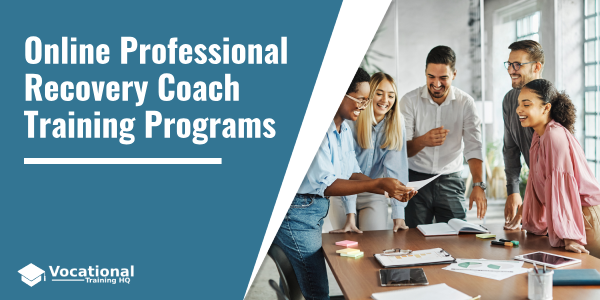
Recovery coaches work closely with clients to help them in their recovery from addiction.
Coaches can work alongside other recovery professionals, like addiction counselors, or independently.
Typically, they have personal experience with addiction, along with recovery coach training.
Article Table of Contents
- 1 Benefits of Online Recovery Coach Training Programs
- 2 Drawbacks Online Recovery Coach Training Programs
- 3 Benefits and Drawbacks of Recovery Coach Online Training Programs – Summary Table
- 4 What Courses are in an Online Recovery Coach Training Program?
- 5 Can You Earn a Recovery Coach Certification Completely Online?
- 6 How Long Does it Take to Earn a Recovery Coach Certification Online?
- 7 How Much Does a Recovery Coach Certification Cost?
- 8 Types of Recovery Coach Certification
- 9 4 Self-Study Tips for Recovery Coach Online Students
- 10 Schools Offering Online Recovery Coach Training Programs
- 11 Final Thoughts
- 12 Frequently Asked Questions
Benefits of Online Recovery Coach Training Programs
There are many benefits to choosing an online recovery coach training program.
These benefits include:
- Working at your own pace
- Less pressure than in in-person classes
- Learning a new career
- Ability to help others
- Developing recovery skills
- A positive outcome to your personal journey
Working At Your Own Pace
Online learning allows you to go at your own pace.
Most programs don’t have deadlines for assignments.
Instead, you’ll have a certain amount of time to complete the semester or the program.
Less Pressure Than In-Person Classes
If you want to keep your life low stress, an online recovery coach training program can help you do so.
There’s less pressure than there is sitting in a classroom.
Learning a New Career
Recovery coach training allows you to learn a new career from the comfort of your own home.
Some programs can be completed in a few weeks, while others are longer and more in-depth.
Ability to Help Others
When you complete your training and begin working as a recovery coach, you’ll be able to help others.
This can be very fulfilling and help give your life purpose.
Developing Recovery Skills
While learning how to be a recovery coach, you’ll learn tools that can help you in your own recovery.
These include an action plan, a vision statement, and self-discovery.
A Positive Outcome to Your Personal Journey
Attending an online recovery coach training program allows you to turn your own experience into something positive.
This can help you to make peace with your own journey:
- Socialization can develop self-confidence and communication skills
- Learning professional skills, including ethics, boundaries, and motivation

Drawbacks Online Recovery Coach Training Programs
Of course, there are drawbacks to an online recovery coach training program as well.
These drawbacks include:
- Lack of physical face-to-face interaction
- No structure
- Social isolation which can inhibit recovery
- Time management can be difficult
Lack of Physical Face to Face Interaction
You may enjoy this aspect, but many people find it difficult.
Your interactions with other students and teachers will be online, rather than face-to-face.
This can make it hard for you to connect with others.
No Structure
When you attend a physical school, you have a set schedule.
This gives you structure.
When you take classes online, you don’t have this structure.
You may find it difficult to function without this guidance.
Social Isolation Which Can Inhibit Recovery
You may feel socially isolated when attending training online because you aren’t having in-person interactions.
Loneliness can be detrimental to recovery, so you’ll need to keep this in mind.
Time Management Can be Difficult
The lack of structure with this type of learning can make time management hard.
You won’t have regular deadlines, so you’ll need to keep yourself on track.
If you struggle with time management, this can be difficult.
Benefits and Drawbacks of Recovery Coach Online Training Programs – Summary Table
| Benefits of Online Recovery Coach Training Programs | Drawbacks Online Recovery Coach Training Programs |
|---|---|
| Working At Your Own Pace | Lack of Physical Face to Face Interaction |
| Less Pressure Than In-Person Classes | No Structure |
| Learning a New Career | Social Isolation Which Can Inhibit Recovery |
| Ability to Help Others | Time Management Can be Difficult |
| Developing Recovery Skills | |
| A Positive Outcome to Your Personal Journey |

What Courses are in an Online Recovery Coach Training Program?
There are several components of an online recovery coach training program.
Of course, the courses in each program will vary, but the basic concepts are usually the same.
Science of Addiction
To be a recovery coach, you’ll need to understand how addiction happens in the brain, and how it changes the brain over time.
If your client has a drug or alcohol addiction, these chemicals will make physical changes in the brain.
Behavioral addictions also create changes in the brain.
This makes the recovery process difficult, because the brain gets used to the substance or behavior, and starts to rely on it.
Recovery Process
Most recovery coaches have first-hand experience in recovery.
However, a recovery coach training program will teach you about the recovery process, and how you can support your clients as they work their way through it.
You’ll understand the stages of recovery, and how to work with your client and other professionals to support your client.
Coaching
Coaching is a critical part of being a recovery coach, as the name suggests.
Traditional life coaches focus on helping clients with a large variety of personal and career challenges, while recovery coaches focus on helping clients recover from addiction.
Although the focus is different, many of the techniques are the same.
You will need to know how to guide your clients.
This can include helping them to identify strengths and weaknesses, prioritize tasks, and create plans for staying sober.
Interviewing and Motivational Techniques
Interviewing and motivational techniques are essential skills for recovery coaches.
You’ll learn how to help clients open up and be honest with themselves and you, so you can help them.
You’ll also learn how to motivate them to stick with the program and keep moving towards their goals.
Case and Crisis Management
It’s important for you to know how to manage a case for your client, and how to keep necessary documentation along the way.
You’ll also need to know how to deal with a crisis, and when you need to get outside help.
Screening and Intake
One aspect of being a recovery coach is finding the right clients.
This means that you will need to understand who can benefit from your services.
If someone isn’t at the right point in their recovery, they may need more intensive help along with, or instead of, recovery coaching.
Your client’s success will have a big impact on your success.
Co-occurring disorders and referral
Co-occurring disorders are common for those in recovery.
If a client has a co-occurring disorder, like anxiety or depression, you may need to help them connect with a mental health professional in addition to coaching.
Ethics
You’ll also learn ethics as a recovery coach.
You are working closely with someone in a vulnerable place in their life, so you’ll need to act with integrity.
It’s up to you to act in their best interest and help them make progress.
You should never do any harm.
HIV and Pathogens Education
Your online recovery coach training program may also include training on HIV and other pathogens.
Those in recovery have a higher risk of these diseases due to their high-risk activities.
It’s a great idea to understand basic safety protocols, as you would in a health setting.

Can You Earn a Recovery Coach Certification Completely Online?
This depends on the state you are in.
You can complete a recovery coach training program completely online.
However, if your state requires you to be certified, you may need experience hours.
This means you may need to work as a recovery coach on a paid or volunteer basis before becoming certified.
This is usually done in person.
How Long Does it Take to Earn a Recovery Coach Certification Online?
This can vary greatly based on the certification program you choose.
Some certification programs are short, requiring about 1 week to complete.
Other programs can take 6 months or a year to finish.
Of course, the longer programs are more in-depth.
However, shorter programs will meet certification requirements in most states.
How Much Does a Recovery Coach Certification Cost?
You’ll have a few costs when earning a recovery coach certification.
The first is the cost of the training program you choose.
For example, the Ed2go recovery coach course is $1,795.00.
It’s offered by colleges in partnership with Ed2go, including Georgia Southern University.
She Recovers offers a few programs.
If you choose to complete the Recovery and Coaching programs, you’ll pay $6,000.
Recovery Coach University offers a 30-hour program for $625, plus a $50 fee for the manual.
You’ll spend 5 days in this program.
NCPRSS Certification
Once you have gone through a recovery coach training program, you can become certified through your state.
You can also take the National Certified Peer Recovery Support Specialist, or NCPRSS, certification.
This certification costs $235 for the initial credential fee and $150 for the testing fee.
Every 2 years, you’ll need to pay a $200 renewal fee.

Types of Recovery Coach Certification
Requirements vary from state to state. Some states choose their own requirements and may have their own testing as well.
However, many states choose to use the NCPRSS or IC&RC standards and testing.
NCPRSS
Many states adhere to the National Certified Peer Recovery Support Specialist, or NCPRSS, certification, guidelines.
To meet the qualifications for the NCPRSS certification, you’ll need to be in recovery for at least 2 years.
You’ll also need 200 hours of hands-on experience, either volunteer or paid.
Usually, it’s best to find a recovery center and work as a volunteer to get this experience.
This requires you to have 60 hours of training in recovery-focused education or training.
This includes 6 hours in ethics training and 6 hours in HIV and Bloodborne pathogens.
Lastly, you’ll need to pass the examination, which can be taken in person or online.
IC & RC
The IC & RC examination costs $49.00.
You’ll be tested in 4 areas, which are advocacy, ethical responsibility, mentoring and education, and recovery and wellness support.
You’ll answer 65 test questions and 10 practice questions.
You’ll need a grade of at least 500 out of 800 to pass the exam.
4 Self-Study Tips for Recovery Coach Online Students
Learning online can be tough, but following these tips can help you stay on track.
1. Build a Study Plan
Creating a study plan can be very helpful.
You’ll need to decide how much studying you need to do each day, and build a plan or schedule that accommodates that.
Break up larger tasks into small manageable ones.
2. Set Goals
You’ll also want to set goals.
Most online recovery coach programs are self-paced, so you’ll need to decide how long you want the program to take.
If you plan to take a certification exam, include taking the test as one of your goals as well.
3. Time Management
Time management can be a struggle for any student, but it can be particularly tough for online learners.
Be sure that you are setting aside enough time for studying each day, and keep your schedule balanced.
4. Get a Learning Area
It’s a great idea to have one area where you do your studying.
When you go to your study area, your brain will know it’s time to focus on your work.
This also allows you to eliminate distractions from your study area.
Don’t forget to make it comfortable as well, so you’ll want to spend time there.

Schools Offering Online Recovery Coach Training Programs
| School Name | Address |
|---|---|
| International Association for Professional Recovery Coaches | 4767 New Broad St Orlando, FL 32814 USA |
| The Academy for Addiction Professionals | |
| Georgia Southern University | Statesboro, GA 30460 US |
| The Institute for Life Coach Training | |
| North Shore Community College | 1 Ferncroft Road, Danvers, MA 01923 |
| Middlesex Community College | 591 Springs Road, Bedford, MA 01730 |
Final Thoughts
Being a recovery coach can allow you to truly make a difference in the lives of others.
Helping others, particularly those who are going through something you have gone through yourself, is incredibly rewarding.
It’s more than a career, it’s a life purpose.
Frequently Asked Questions
What are the goals of a recovery coach?
The ultimate goal of a recovery coach is to help a client be successful in their recovery.
In addition to staying clean and sober, a coach will want their client to do well in their personal and professional lives.
They want their client to be mentally and physically stable.
What skills do recovery coaches need?
Recovery coaches need strong communication and interpersonal skills.
You’ll also need to have empathy and be good at encouraging clients.
You will also need to be an effective problem solver.
Do I need to be certified as a recovery coach?
Most states require you to be certified.
It’s also much easier to find clients if you have credentials that show you are knowledgeable.
Remember, clients are trusting you to help with their recovery, so it’s important that they know you can be effective.
What are the ethics of a recovery coach?
Some organizations have their own specific ethics.
Generally, ethics include maintaining your own personal recovery, not causing harm, bringing hope to those who need it, and acting with kindness and empathy.